Meta Fiction As a Funhouse: How Supernatural Smashes and Distorts The Fourth Wall

As a television program, “Supernatural” has never been afraid to take dares. It’s tackled the Apocalypse. It has sent both of its main leads to Hell—and brought them back. It has had a main lead without a soul for half a season. It’s looked at all those things that go bump in the night and thrust them into our living rooms unabashedly. “Supernatural” has even made one of their main leads the vessel for Lucifer himself. Riskiest of all, however, is its penchant for delving into meta fiction.
Meta fiction. The term can be confusing and misunderstood. Meta fiction is a two headed beast. Its first is indirect meta fiction. It is the invisible web a story hangs upon. It is the skeleton. A story, much like a body, is only as strong as its skeleton. Each bone in the story must connect to the rest correctly or it can fall apart. What might seem an arbitrary selection—a choice in music, the color of a favorite shirt—are all deliberate to reveal something about character or plot. Everything is essential or it is cut. Anything extraneous detracts and distracts. Those writers that employ good indirect meta fiction can take their viewers or readers any place they so choose, and they’ll gladly follow—even if it is off a cliff. Essentially, if they’ve done their job, the indirect meta fiction is largely unnoticeable, much like good mechanics such as grammar and spelling.
The other is that of direct meta fiction. Of the two, it is direct meta fiction that is most misunderstood. It is the open acknowledgment that what is being presented is fictional. It often recognizes itself, discusses its medium, and as Supernatural does, pokes fun at itself. This can either be a blessing or a curse to a story. Direct meta fiction is not always well received. It is a risky move to pull back the curtain and show the inner workings of the meta fiction skeleton, baring it to the audience. Done correctly, it can be pure gold.
As early as season 1, “Supernatural” has explored direct meta fiction. The first hint that direct meta fiction will be a part of “Supernatural’s” fabric is found in the Pilot. Dean refers to the real FBI agents that arrive to the crime scene as “Mulder and Scully.” A good portion of the “Supernatural” writing team is from the “X-Files,” thus paying some homage to the show that came before it. In “Phantom Traveler,” there are several references made to the movie Poltergeist. The show’s genre and predecessors are often brought in as quips and asides to the overall story, calling out the fictional aspect of its nature.

The episode “Hell House” is the first actual direct meta fiction episode. It is subtle in its nature. It is far away from the unabashed “The French Mistake.” “Hell House” starts off as a typical episode. A group of teenagers approach a rundown and abandoned house, talking about the rumors that it is haunted. They scoff, joke around, and dare each other to go in. They think the whole story is made up, stupid, and harmless—until they see a woman hanging from the cellar rafters, dead. By the time the cops arrive, there is no body to find. This story draws attention to the town—namely marking it as a possible hunt for the Winchesters.
The main motif this episode employs is that of pranks and pranking. It is how they introduce meta fiction in a subtle and clever manner. The episode itself is a prank upon the audience—one that they are fully let in on. It is also the technique that will carry over in some form through out every other meta fictional episode “Supernatural” has ever done.
In the first scene featuring Brothers Winchester, we find a bored Dean amusing himself at a sleeping Sam’s expense. He sticks a white plastic spoon into Sam’s open mouth, takes a photo with his camera phone, then turns up the stereo to startle his younger brother awake. Sam is not amused. He says to Dean, “Man, we”™re not kids anymore, Dean. We”™re not gonna start that crap up again.”

The prank war seen in this episode, in some ways, might be directly responsible for the fandom myth that Jared and Jensen are pranksters to the guest actors for the show. Considering it seems that none of the guest actors at conventions can tell a story about a single “pranking” incident, it makes one wonder where this idea came from. Remembering the nature of the monster in this episode, it makes one think!
When they arrive, Dean isn’t quite convinced that this isn’t simply teenagers pulling pranks on the cops. Sam makes his case that they should at least thoroughly check it out, that they really have nothing else to do now that they’ve let their father go, and so they start the normal routine of questioning witnesses.
This is where it becomes different. Every single teenager that was at the house has a different story, a different detail. Some say the girl that was hanging was a red head, others a blond. One swears that the girl was kicking while another says she wasn’t moving at all. The symbols are described in detail, most of them as contradictory as any thing else they’ve said. This will most certainly make their jobs harder.
They meet Craig, who works at a record store. He knows about the story behind Hell House, and fills the brothers in on the story—omitting the fact that it is his created story. There is no haunting in the Hell House, at least not the normal kind. Until Craig created this story, there was nothing for Sam and Dean to hunt at all. To connect the prank war that Sam and Dean are currently engaging in, the whole haunting that Craig has created is also a prank.
In this episode, we meet Ed Zeddmore and Harry Spangler, two goof balls who want to become famous and make a television series. Their very names harken back to “The Ghostbusters,” yet another reference to a predecessor to “Supernatural.” Sam and Dean are often considered by the writing team to be the Ghostbusters in a way, so by placing Ed and Harry onto the scene they’ve pulled this inside joke in for the fans. In fact, Dean even brings The Ghostbusters”™ theme further into the story by shouting out the tag line of the theme song, “Who you gonna call?” to distract the cops from him and Sam onto Ed and Harry.
They have touted Craig’s story on their website “hellhoundslair.com,” and tried everything to encourage its spread. What’s ironic about this is the fact that Ed and Harry have been pranked. This Hell House isn’t real. It’s a made up, fabricated story, and they fell for it, hook, line, and sinker. The footage they had hoped to gain and then sell to Hollywood would be missing one key ingredient: evidence of an actual ghost. Yet, they’ve unwittingly created a monster that Sam and Dean must now destroy.
It is a Tulpa, a monster that is created by thought alone, channeled through a Tibetan spirit sigil. Ed and Harry didn’t paint it, but their website surfers have certainly used it just as unwittingly to make the haunting they believe in to be real. This turns the prank Craig started back onto Craig in a weird twist.
Ed and Harry are a mirror held up to Sam and Dean. They’re the geekier, sillier, and inept version. If they seriously entered the realm of hunting, it is likely they would not survive for long. It’s not real to them. This is merely a vehicle to make it in Hollywood. Unlike Sam and Dean, they don’t bother questioning the haunting, they aren’t aware that it is a hoax, and they’ll fall for any lie fed to them, even one Sam and Dean provide—not once, but twice.
This is essentially the first time “Supernatural” makes fun of itself. It does so in a witty and novel way. The story line of the show is very serious, dark, and often earns it the classification of horror. There shouldn’t be room for such tongue in cheek behavior. Yet, time and time again, this has worked well for “Supernatural.” We, as the viewer, know that Ed and Harry ARE Sam and Dean essentially, and that is why we laugh. It’s why even Sam and Dean laugh. Their dual pranks on their ridiculous doppelgangers gives them the last laugh at the end of the episode.
It isn’t until season 3’s “Ghostfacers” that we see Ed and Harry again. Before we jump there, let’s look at the direct meta fiction episodes in order.
Our next, much more bold taste, is found in “Hollywood Babylon.” It picks up the prank motif from “Hell House,” to start the possible hunt for Sam and Dean. A man has been been found dead on set, but it is a hoax to promote the movie being made: Hell Hazers II: The Reckoning. Much like “Hell House,” the hoax turns deadly real when a studio executive, Brad Redding, dies on set. He is hung in the middle of a scene being shot for the movie. This mirrors the death of a now very real ghost: a young actress in the 1920s that had been scorned by a studio executive leading her to hanging herself.
Unlike the more brazen “The French Mistake,” Sam and Dean are not actors. They are crew members, working in the grunt position known as a PA. Dean isn’t certain what that is, but Sam quips, “I think they’re like slaves.” They watch the actors work on set, help provide coffee runs, and keep track of scripts, all the while working the actual case. It touches the “fourth wall” without entirely breaking it down, bringing the viewer into a behind the scenes exposé on how the show is put together in a comical and satirical manner.
Not only is the episode itself pure meta, but a lot of the references made refer back to a real individual within “Supernatural.” The director for the movie, McG, is named for a real producer of the show. He even makes an actual appearance, not unlike Alfred Hitchcock, within the episode. When Sam and Dean are on the Hollywood tour, the tour guide announces that they might be lucky enough to meet one of the stars of Gilmore Girls. At this, Sam gets an uncomfortable look and bolts the tour bus. Jared played Dean Forrester on the program in 65 episodes. Sam complains to Dean that they’re wasting time in Hollywood, but Dean insists that he wants a break, to go swimming. Sam quips “Does this feel like swimming weather to you? It’s practically Canadian.” Supernatural is filmed in Vancouver, pulling in their real shooting location into the fabric of the show. The actress staring in Hell Hazers also starred in Boogeyman, at least within the canon of the episode. The film was penned by Eric Kripke himself.
Aside from these types of references, “Hollywood Babylon” parodies not just how the show itself is made, but how Hollywood itself operates. Brad Redding’s complaints about the darkness of the movie are the same complaints Kripke has heard from CW executives throughout the making of the show. The use of salt and Latin chanting by the actors in the movie harken back to “Supernatural’s” very own weapons against ghosts and demons. The actual use of shotguns, something brought up by the producers as a whim and shot down quickly amuses Dean. Ironically, it is the very thing they end up using in the movie after Sam and Dean, actually solving the case employ them.
The creator of the monster in this episode is appropriately a writer. Walter Dixon wrote the script that has been since rewritten to sell to the average movie goer. They’ve replaced his careful attention to detail and use of real incantations with “cleavage and fart jokes.” This expresses a frustration within the Hollywood system that favors the lowest common denominator in entertainment over quality. In the episode, Dixon wants to punish the executives and other producers for ruining his life’s work. He summons and then binds to a talisman a number of ghosts to kill at his beck and call.
Unfortunately for Dixon, he smashes it, releasing the spirits from his control. At this, they set out to murder him for forcing them to kill at all. This death will later be repeated in “The French Mistake” when Eric Kripke and a number of the producers are gunned down in the episode.


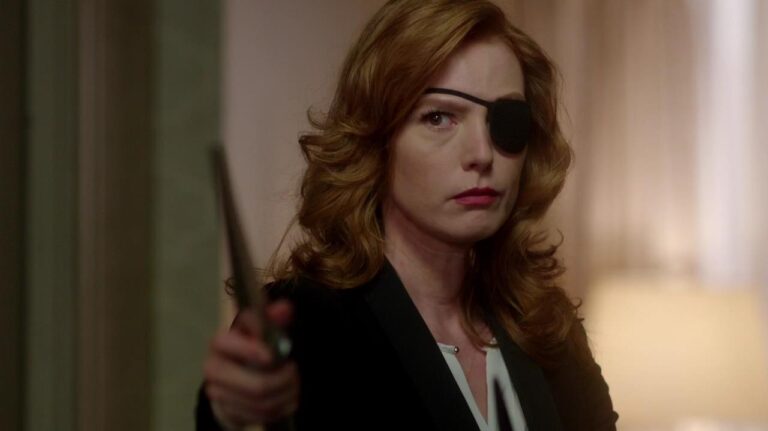
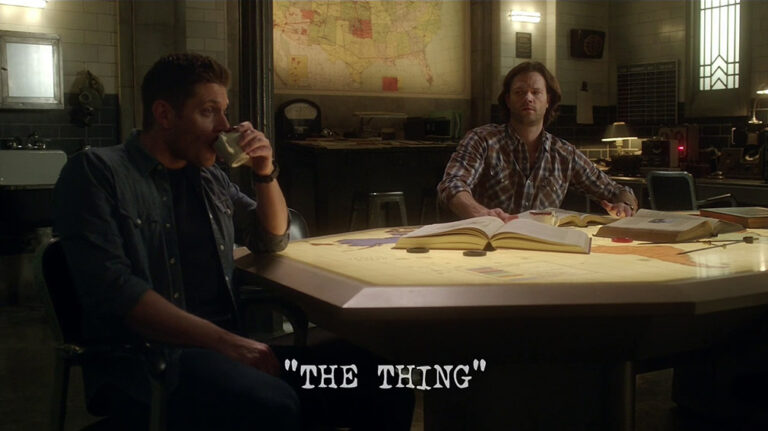
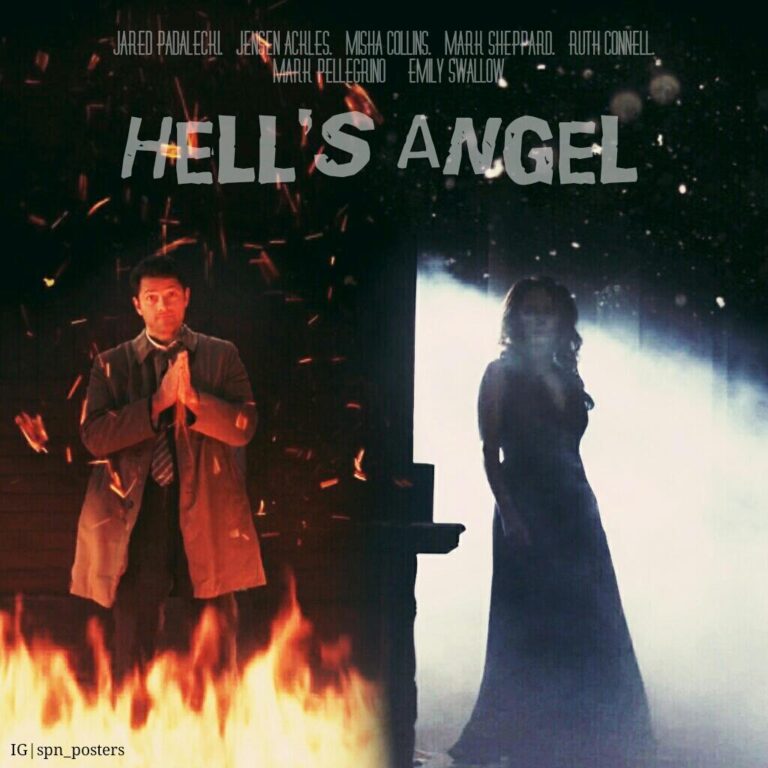
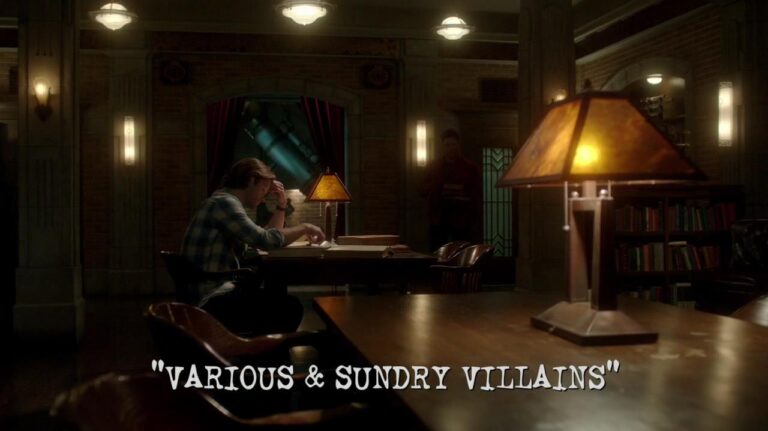
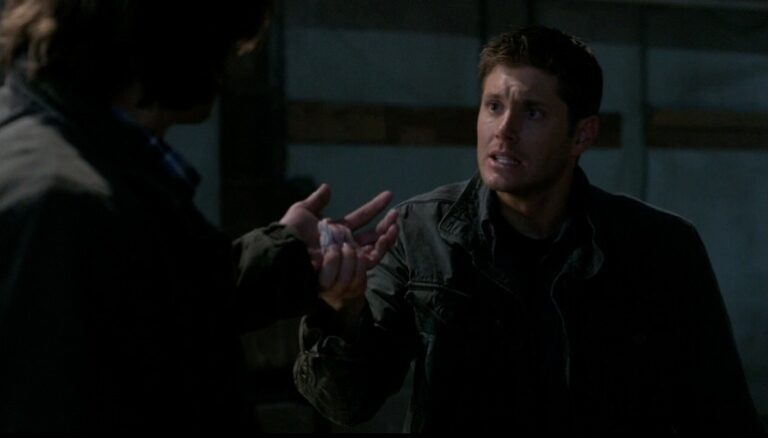
I love the photo choices, including that of Dean flipping the bird. Perfect. Thanks again, Alice!
Thanks for a really interesting article. I love the meta episodes, with Hell House and Ghostfacers being a couple of my all time favorites. and I still smile every time Monster at the End of the Book is brought up. The only time I think meta was taken too far was when EK spoke to the fans who may be critical of Swan Song in saying “Endings are hard…” I feel like when a writer has to counteract any possible criticism beforehand, that that is a sign of a bad script at best or, at least, an upfront apology. Either way, feeling a need to insert something like that should have been a red flag to the writer.
I’m looking forward to the second part of the article.
I’m glad you enjoyed my look at the meta. I’m a Meta Head, probably rotten to live with since I eat, breathe, sleep writing.
As for the “Swan Song” slight from EK, I disagree. I think what he was saying, and it is oh so true, that no matter what artistic endeavor you undertake, someone will not like it. It just is. It’s not a slight to those who might be disappointed by a finale or episode or storyline. It’s just a fact. Just like there’s people who will always love everything no matter what. But that’s just my opinion, as a writer, that this will always be a truth. You can’t please everyone and that’s basically what I took from that statement.
My complaint is directed toward the need to say it in the first place, not what was said which is, I agree, a fact of life. Actually, even though I absolutely hated the last ten minutes of Swan Song, I took the whole episode to be a love letter from EK to the fans. I think he did, in fact, try to give us something special. I particularly liked the voice-over about the Impala, since up until S6, I considered the Impala another very pretty cast member. I even loved that cheesy cemetery entrance with Rock of Ages blasting.
But, I’m with you on meta. I love it.
I am so glad to not be the only Meta Head.
As for this, I don’t know, I still disagree. Endings ARE hard to pull off, not just for the whole making people happy part, but to give it a fitting end or a good close.
All I’ll say is see what I have to say about Swan Song in the second part. I cover that in this one, counting it as a part of this Meta Overview more or less, even if it doesn’t have the “prank” the way the others do necessarily.
Thanks for this. I love the meta episodes. They can have a lot of humour, but they can also have some tragedy. Best of both worlds. “Ghostfacers” and “Monster At The End Of This Book” are two of my favourites. I’ll be looking forward to your next part. Kudos for the pictures, I do love the one of Dean flipping the bird. Priceless!
You can thank Alice for the photo choices.
I also love these episodes. I think they’re the reason I fell so damn hard for the show in the first place. These episodes, to my writing heart, were just what I needed to get into my own again.
And yes, Dean flipping the bird is classic. If they were on a more risque channel, I have a funny feeling we’d see that more often.
This was a great read. I barely get around to read many articles lately but I had to read this one.
I love the meta episodes. I always enjoyed watching those together with my boys. That’s when I realized, that a lot of those jokes are lost on ordinary viewers. Meaning those who just watch the show without getting involved in the fandom. Kind of feel sorry for those people. They are missing out on so much.
I look forward to the second part of this. Thanks for bringing it to us.
I’m glad you chose my article to read! I had a lot of fun writing it, I’ll admit. I SHOULD be working on the novel, but this said “write me.”
Yeah, I think it’s more than just the fandom insider jokes, though. It’s those that don’t investigate the nature of story telling that miss out on these episodes at times, but maybe that’s just me.
I do hope you’ll like the second half as much as this half.
Loved this article Far Away Eyes!!!
I too love all the meta episodes. Hell House is a particularly beloved one for me when I want to watch something without too much angst and Edd and Harry are quite hilarious in it. Just leaves me with a good feeling. (fish in the back seat, Hah!)
Loved the spoon, the glue and the laughing fisherman and poor Harry having to pee in front of people. 😮
Looking forward to part 2.
I’m glad I’m not the only Meta Head.
I started this almost as a whim while cleaning out the closet. I stuck in Real Ghostbusters and then decided, “Hey, why not talk about the direct meta episodes?” I know there’s more, like Changing Channels or even Tall Tales, but they’re more subtle and don’t tie to the ones I chose nearly as neatly. Who knows, I might do something more with those meta episodes. I do know I’d like to compare No Rest for the Wicked to Yellow Fever, as meta fictionally they mirror each other in a lot of ways.
Ed and Harry, what can you say about Ed and Harry besides that they’re hilarious and a riot. I do really look forward to seeing Hell House (already saw Ghost Facers while working on the article) on my new big 40″ TV. I’m going through the series, hopefully all before season 7, but we’ll see.
I’m glad you enjoyed the article. That’s interesting about the sigils. I don’t know anything about that unless I actually sit down to study that, so it’s neat to hear that type of thing! I learned something. Yay for learning!
I really enjoyed this. I hadn’t really spent much time thinking about meta episodes in the series outside of “Monster at the End of This Book,” “The Real Ghostbusters,” and “The French Mistake,” (though intellectually I knew “Hollywood Babylon” and “Changing Channels” were meta to some degree), so I found this very thought-provoking.
Interestingly, my mother will watch SPN on and off, if I tell her about a particularly interesting episode coming up (like “The French Mistake” or “Frontierland”) or if I’m at home and watching it, but she thinks the show’s strength is in how it doesn’t take itself too seriously; when it starts getting heavy, she thinks it strays into the bad side of campy.
Point being, it’s interesting to see what meta episodes can do for the show’s tone and reputation. SPN does a good job of continuous quippy banter, one-liners, and ongoing jokes to (usually) keep it from taking itself too seriously, which I think allows meta episodes to work well in the framework. If every episode were dark like “The End,” meta episodes would feel completely out of place. Instead, the show does a good job of keeping an overall tone and feel that lends itself to funnier, more experimental things. And that’s something, for me as a viewer, that keeps me interested and entertained.
I think Jensen put it best when he was asked about the comedy and self deprecation this show tends to do. He then turned it around by saying that the drama they do on the show matches any other drama other shows do. Don’t believe him? Watch On the Head of a Pin again or The Man Who Would Be King or All Hell Breaks Loose I and II. This show can get heavy and dark, but they do keep, even in those dark episodes, the humor and sarcastic wit that keeps it from, as your mother things, from going all campy.
Take for instance, Dean’s insistence that Sam get the pie in All Hell Breaks Loose Part I. He earns himself a disgruntled response from Sam, and we laugh, but we know danger is lurking for them soon. I think the make up of both Sam and Dean’s characters is what lends them the ability to keep a tongue firmly in cheek, even in the dark and angsty episodes. There’s a line that makes us laugh and lightens the tone, even if it’s for a moment.
The funny thing about the meta episodes is how far they’re willing to go all out campy, deliberately. It’s also why it’s hilarious. Becky is probably the most campy character they’ve ever had—and yet she’s delightfully hilarious. That’s in part two, though.
What I find fascinating about this show is that they are willing to make fun of themselves and their audience. Yet, it doesn’t come off as insulting. They’re more like open invitations, saying “Come on in, join us. We want to laugh at ourselves and you can, too!”
Too many shows on television follow the “srs bzns” thought pattern, and when they get going, they can turn the viewer off because they seem to be sermonizing or preaching. Supernatural dances a fine line with their chosen subject matter, and yet they pull off keeping us from getting too far into preachy mode.
That’s probably why I love it more than any other show. I watch Gossip Girl for Leighton Meester (shush. It’s a girl crush.), but I find that when it wants to point out that the characters are behaving badly that the moral discussion hits too hard—kind of like a two by four.
Completely agreed on all points. There’s something really special about [i]Supernatural[/i] in its ability to balance the drama and angst with both witty and campy humor–and all of it feeling like it belongs on the same show. I’m usually iffy on comedy since my sense of humor is pretty specific, but SPN does a good job of catering even to my funny bone.
I think that it’s, as you say, a welcoming kind of self-deprecating humor. It’s easy to appreciate people who can laugh at themselves; it’s easier to trust people like that, too–and that in turn helps me trust the show, I think. “We’re all having fun here, come join us!” type of attitude. “There’s a great joke here that we want to share with you!” It’s not something you see done all that much, and I think that’s part of what has drawn me into the show so intensely compared to, well, just about any other fandom I’ve been a part of.
I have a twisted sense of humor I’ve discovered, and this show has a twisted sense of humor. See anything Ben Edlund has added in comic relief for this show. That sobbing suicidal talking Teddy Bear? Yeah, totally laugh every time. I. Am. Twisted. I figure the whole if you’re not laughing you’re crying thing applies to the show. They are facing life and death and nightmares every day and they have to have something to use to cope—besides alcohol and easy lays.
To me, and it’s one reason I wrote the meta article the way I did, this show was written for writers and people who enjoy great storytelling that is able to poke fun at itself and the art of storytelling. They are so inviting to the viewer, calling inside jokes from the actual fandom over and over, making US the fans as much of the fabric of the show as anything else.
After all, Jared says they do call us their family. Letting those of us who GET it, really GET it in on the joke, that’s just gold.
And this is why this show has what I call REAL fans. We get it. I have a friend that watches when I remind her that is. Come Monday morning, I’ll ask what she thought of the episode and I’ll realize she just didn’t get it. You need to pay attention and watch multiple times to catch every little nuance. This is why I love you guys, I know you understand my obsession, cause we all have it!
That’s the best part about this show for me. No matter how many times I watch or rewatch, as a whole, or in a single episode, there’s something NEW to catch, something I missed. A new layer is revealed. It’s just so neat.
And yeah, those of us who get it, really get it, that’s why we’re here all sharing in our Supernatural Anon.
Mighty Meta Morphin Power Rangers. Brilliant.
Thanks. It was one of those “Write me or I won’t leave you alone.”
I’m glad you liked it so much. Sometimes being a Meta Head has its advantages.
I was just innocently reading this article, where it says “As in… Sam-Slash-Dean. Together. â€, which I had at the bottom of my screen. I then clicked down to see the picture to accompany it and nearly choked on my grape. That screencap was perfect!
Well-written article, thanks for the read.